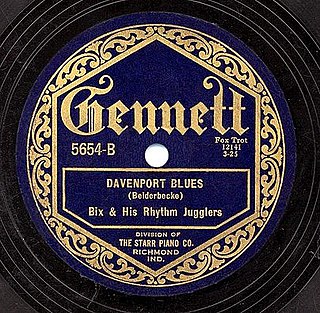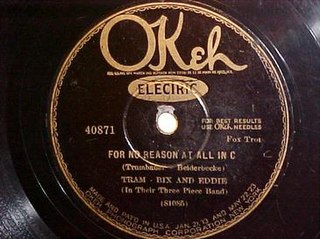Related Research Articles

Leon Bismark "Bix" Beiderbecke was an American jazz cornetist, pianist, and composer.
Don Murray was an early jazz clarinet and saxophone player.

Joseph Gustaf "Sharkey" Bonano, also known as Sharkey Banana or Sharkey Bananas, was a jazz trumpeter, band leader, and vocalist. His musical abilities were sometimes overlooked because of his love of being an entertainer; he would often sing silly lyrics in a high raspy voice and break into dance on stage.

James Dorsey was an American jazz clarinetist, saxophonist, composer and big band leader. He was known as "JD". He recorded and composed the jazz and pop standards "I'm Glad There Is You " and "It's The Dreamer In Me". His other major recordings were "Tailspin", "John Silver", "So Many Times", "Amapola", "Brazil ", "Pennies from Heaven" with Bing Crosby, Louis Armstrong, and Frances Langford, "Grand Central Getaway", and "So Rare". He played clarinet on the seminal jazz standards "Singin' the Blues" in 1927 and the original 1930 recording of "Georgia on My Mind", both inducted into the Grammy Hall of Fame.

John Jean Goldkette was a jazz pianist and bandleader.

Giuseppe "Joe" Venuti was an Italian-American jazz musician and pioneer jazz violinist.
The Victor Recording Orchestra was a jazz band led by Jean Goldkette. Founded in 1924, it was considered by Rex Stewart to be the best dance band of its day and the "first original white swing band." It was known for its innovative arrangements and strong rhythm.

Orie Frank Trumbauer was one of the leading jazz saxophonists of the 1920s and 1930s. His main instrument was the C-melody saxophone, a now-uncommon instrument between an alto and tenor saxophone in size and pitch. He also played alto saxophone, bassoon, clarinet and several other instruments.
Newell "Spiegle" Willcox was a jazz trombonist. He was born Newell Lynn Willcox in upstate New York, and learned valve trombone as a youngster under the tuition of his father, Lynn Willcox, an amateur musician and bandleader. He acquired the familiar nickname Spiegle as a student at the Manlius Military Academy, where he played in the school brass band.
Bill Rank was an American jazz trombonist.
Sterling Belmont "Bozo" Bose was an American jazz trumpeter and cornetist. His style was heavily influenced by Bix Beiderbecke and changed little over the course of his life.

The Wolverines were an American jazz band. They were one of the most successful territory bands of the American Midwest in the 1920s.
Joseph Anthony (Fud) Livingston was an American jazz clarinetist, saxophonist, arranger, and composer. He co-wrote the jazz and pop standard "I'm Thru With Love".

Chauncey Morehouse was an American jazz drummer.

Bix is a 1991 Italian drama film about the final years of cornet player Bix Beiderbecke. It was directed by Pupi Avati and was entered into the 1991 Cannes Film Festival.

The Leon Bismark Beiderbecke House is a historic building located on the east side of Davenport, Iowa, United States. The house is the birthplace and boyhood home of jazz musician Leon Bismark "Bix" Beiderbecke and so the house is also known simply as the Bix Beiderbecke House. It has been listed on the National Register of Historic Places since 1977.

Davenport Blues is a 1925 song composed and recorded by Bix Beiderbecke and released as a Gennett 78. The song has become a jazz and pop standard.

"For No Reason at All in C" is a 1927 jazz instrumental by Bix Beiderbecke, Frankie Trumbauer, and Eddie Lang. The song was released as a 78 single in 1927 on Okeh Records as by "Tram, Bix and Eddie ".

Copenhagen is a jazz standard composed in 1924 by bandleader Charlie Davis and first recorded in that year by the Wolverine Orchestra featuring Bix Beiderbecke in a foxtrot tempo. The title refers to Copenhagen tobacco, favored by Davis's bass player. Lyrics were added by Walter Melrose.
William H. "Bill" Challis was an American jazz arranger, best known for his association with the Paul Whiteman orchestra.
References
- ↑ "Jean Goldette and his Orchestra" Archived 2013-03-29 at the Wayback Machine The Red Hot Jazz Archive. Retrieved 19 June 2013.